Abortion
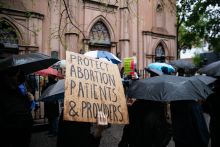
After the June 2022 Supreme Court ruling in Dobbs v. Jackson Women’s Health Organization which overturned Roe v. Wade,the landscape of abortion access in the U.S. shifted dramatically. In the past year, many Republican state governments have moved to further restrict or fully outlaw abortion, while some states with Democratic legislatures and/or governors have written abortion protections into law. In every state, pregnant people face difficult decisions and shifting barriers to receiving abortion care.
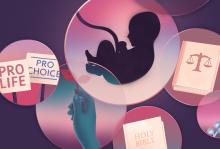
THE REPRODUCTIVE HEALTH landscape in the United States has changed drastically in the last year, and it continues to change. But some things remain the same. One consistent aspect of our ongoing national conversation is that many of those who support the greatest restrictions, including on access to abortion and other elements of reproductive health, claim Christian faith as a primary motivator.
I spent much of my young adulthood in evangelical contexts where people had strong opinions about faith and reproductive rights. Most evangelicals I knew believed that life begins at conception and thus abortion should be broadly prohibited by the law as akin to murder. In these spaces, the Bible was considered the main — sometimes the only — source of authority when it came to navigating ethical questions. I’ve come to realize, though, that the Bible hardly speaks anything straightforward into the intensely personal realm of when human life begins and what decisions should be made in complicated, real-world situations.
I wonder, then: What does it look like to wade through this murky territory as people of faith? Who are Christians called to be in a post-Roe world?
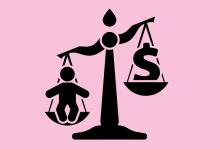
“Wisdom speaks her own praises, in the midst of her people she glories in herself.” What a luscious, full-bodied image from the biblical book of Sirach (24:1). Wisdom has sass! In an increasingly combative society, I’m drawn to Sirach’s prudence, poetic excess, and the authoritative agency of Lady Wisdom.
I’ve been keeping phrases from Sirach, also known as Ecclesiasticus, in mind as post-Roe legislation rolls across the states. The health of women and children (born and unborn) has been weakened, rather than strengthened. Political and social platforms ring out with dangerous nonsense about making criminal statutes apply at the time of fertilization, allowing the death penalty for abortion, or, conversely, promoting violence against “pregnancy crisis centers.”
How do we stop the howl when we feel urgently that lives are on the line? Sirach, which is part of the Catholic canon, says, “The fear of God is an abundant garden; its canopy higher than all other glory” (40:27). “Fear” means “body-trembling awe” before our Creator. Amid so much that I don’t understand and don’t know what to do about, this strange scriptural juxtaposition feels like Lady Wisdom speaking to our present condition.
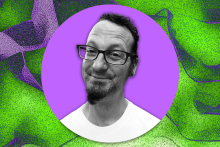
When I opened Shane Claiborne’s new book, I rolled my eyes and sighed. Claiborne’s book, Rethinking Life: Embracing the Sacredness of Every Person, was dedicated to “all the women of faith over the centuries, the midwives of a better world, and to the two most significant women in my life—my mom, Patricia, and my wife, Katie Jo.”

IN THE EIGHTH season of Call the Midwife, set in post-war east London, nuns and nurse midwives of Nonnatus House assist a woman with severe complications from a “backstreet” abortion. Sister Julienne says to a young nurse, “The word ‘midwife’ means ‘with-woman.’ A woman in that situation needs somebody by her side.”
I’m pro-choice, which was an unpopular stance in the Catholic community I grew up in. For my views on reproductive rights, people in youth group called me a “baby killer” and “Pontius Pilate.” During Advent, specifically, I loathed the hollow teachings on Mary and childbirth. We sanitized the Nativity into a cute story — the equivalent of a Disney movie featuring a white family and a manger crowded with men. Only recently did I learn that some scholars believe that midwives attended Jesus’ birth. As reproductive freedom and care are further undermined in the United States, this is an apt time to reclaim a more feminist view of the Nativity and rethink Advent as the season of the midwife.

Whether the restrictions that undermine compassionate decision-making are imposed by law or systemic inequalities such as poverty, the moral imperative to support careful, compassionate decision-making should drive public policy away from any such restrictions.
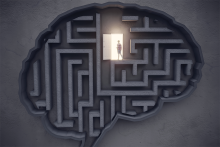
FOR 30 YEARS, I held an uncompromising conviction that abortion was murder. I preached against “child-killing,” suffered multiple arrests for blockading clinics, and had pro-choice groups successfully sue me. I led a national anti-abortion organization and directed the only large-scale annual pro-life event held in the U.S. Capitol. I personally appealed to Supreme Court justices to overturn Roe v. Wade.
Today, I no longer have these positions, and I did not applaud the recent reversal of Roe. I remain an evangelical by belief, but I now call myself a “pro-choice pro-lifer.” I have concluded that legislators and judges are not the people to try to resolve this complex, moral, social, and health-related question. Even among religions, there is no consensus on what constitutes permissible or impermissible abortion. Moreover, each woman’s experience with pregnancy is unique. Therefore, there can be no universal mandate forcing her to continue her pregnancy.
My transformation from an absolute to a nuanced position on abortion proceeded slowly and fitfully. Many exasperated old pro-life movement friends ask, “Whatever happened to you?” The short answer: empathetic listening. There came a moment when I realized I was doing all the talking and no listening on this subject. For nearly three decades, I had lived isolated in a fantasy where I presumed everything would work how it was supposed to, so I questioned nothing. In this fictitious pro-life world, all a woman in an unwelcomed pregnancy needed was to call out for help. In response, pro-life people would instantly help her, offering free housing, parenting supplies, medical care, babysitting, and, should she so choose, adoption. “With so much support,” I asked my audiences rhetorically, “why would anyone choose abortion?” I didn’t want answers.
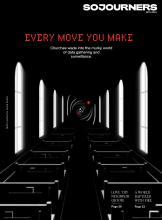
How do marketing techniques, such as surveillance and data gathering, fit with the mission of the church?
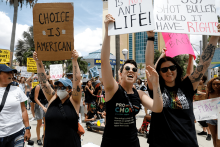
Clergy members of five religions sued the state of Florida on Monday over a new law criminalizing most abortions in the state after 15 weeks of pregnancy, saying the ban violates their religious freedom rights.
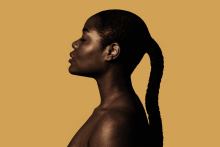
I have been ruminating on the significance of being a pro-choice Black clergywoman in a post-Roe United States. I understand how this may sound subversive despite the fact that two-thirds of American women disapprove of the Supreme Court’s decision last Friday to overturn Roe v. Wade. To some people, it’s incompatible that I could be a minister and support someone’s right to choose to have an abortion.

HISPANIC CULTURES ARE profoundly relational. Family is family whoever they are, whatever they believe, and whatever they have done. Family also includes people who are not blood relations; being family is a way of life. Being family means that the suffering of our daughters and our mothers, our sisters and our cousins, matters. Our relationship with God also matters to us, and how we see and sense the voice of God influences our choices.
So, what does this all mean when it comes to abortion?
Whether or not Hispanics fight to affirm Roe v. Wade, our fundamental perspectives may not fit neatly into the two sides of the debate. While some values are shared across generations, they are differently weighted in ways that impact political decisions, creating a family dialogue that is profound and deeply emotional.
A core precept of liberation theology in Latin America, and its evangelical cousin misión integral (holistic mission), is the power of place and position in determining perspective. While it is not possible to talk about a single “Hispanic culture,” given the broad diversity of the Hispanic community, there are common experiences and values between various Hispanic cultures that impact the way that we see the moral, scriptural, and spiritual issues in the abortion/choice debate.
The following formative experiences and values have significant impact for many of us.
Seeing God in babies. I remember when I was a pastor of an English- and Spanish-speaking congregation trying to
explain to the English-speaking members why we let children run around the church freely, appreciating their playfulness. On a deeper level, I remember explaining why we would take in a distant cousin’s child to live with us without a moment’s hesitation. In traditional Hispanic Catholic circles, the figure of Christ as a child is one of the most popular depictions, along with Madonna and child images. There are many Hispanic people who are deeply troubled by abortion. If we can’t know the exact point at which cells become a baby, many Hispanics would feel like we should approach the question with fear and trembling.
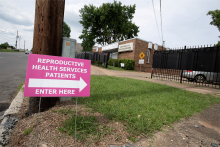
Now that federal abortion rights have been struck down by the Supreme Court in Dobbs v. Jackson, we need a new sanctuary movement that takes seriously the threat posed by the criminalization of abortion and acts to care for those seeking it.
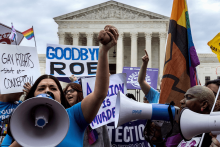
The Supreme Court overturned 49 years of federal abortion rights on Friday, in its decision on Dobbs v. Jackson Women’s Health Organization. Faith leaders and advocates told Sojourners they were not surprised by the court’s decision, which was nearly identical to the draft leaked in May. However, many leaders echoed Rev. Katey Zeh, CEO of the Religious Coalition for Reproductive Choice, who told Sojourners that “the emotional impact of a moment like this can’t be underestimated.”
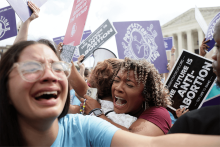
The U.S. Supreme Court on Friday took the dramatic step of overturning the landmark 1973 Roe v. Wade ruling that recognized a woman's constitutional right to an abortion and legalized it nationwide, handing a momentous victory to Republicans and religious conservatives who want to limit or ban the procedure.
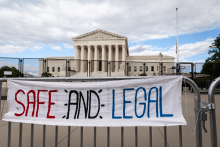
As the country awaits the Supreme Court decision on federal abortion rights in Dobbs v. Jackson — which many expect will overturn Roe v. Wade — politicians, activists, pollsters, and news outlets are highlighting polling on abortion.
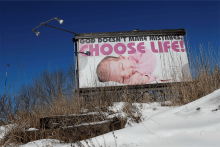
Sharing my story about anything related to abortion causes me to worry for many reasons: For one, in the evangelical context I grew up in, “pro-choice” might as well have been a four-letter word. Secondly, it’s fair to wonder, “What does this dude from New Hampshire, who has had no personal experience with abortion, think he has to offer to this contentious, decades-long debate?” But that’s kind of what this story is about — it’s not what I know about abortion, but what I didn’t.
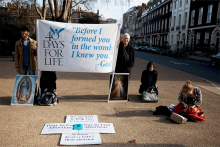
I told my congregation that nine years earlier, on a cold January morning, I walked into a Planned Parenthood clinic.
Before you read further, let’s pause: What story do you think I’m about to tell? What assumptions about me or my circumstances did you make? Do you see me as someone with less moral authority than when you started reading? Take a moment to think.

Deeply flawed and alarming. That was my reaction last week as I read the leaked draft of the Supreme Court opinion that would repeal Roe v. Wade, unravelling nearly 50 years of judicial precedent and placing abortion rights into the hands of state lawmakers.
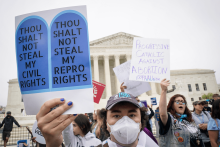
On the evening of May 2, Politico reported on a leaked draft of a Supreme Court decision in Dobbs v. Jackson which, if it became official, would overturn Roe v. Wade and end federal protections of abortion rights.

As Baptist minister and CEO of the Religious Coalition for Reproductive Choice, Zeh has participated in plenty of “circular conversations regarding the moral absolutes of abortion.” But as she writes in her new book, A Complicated Choice: Making Space for Grief and Healing in the Pro-Choice Movement, these debates often overlook how abortion always “happens within a person’s real, full, and complex life.”